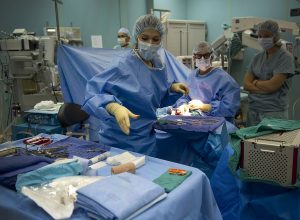A licensed practical nurse (LPN) is one of the many front-line health care professions. They require many skills to accomplish patient care, treatment, and health education. In Alberta, most LPNs work for Alberta Health Services (AHS), with few exceptions. But how much can you expect to make with a career as an LPN?
How Much DO LPNs Make Alberta?
The average wage for LPNs in Alberta ranges between $26.45 to $34.63 hourly. However, more specific care services, such as renal dialysis, allows LPNs to make $26.73 to $34.97 per hour.
In Alberta, LPNs work an average of 30 hours per week. Therefore, with average hours in mind and a wage average of $30.02 per hour, the average annual salary in Alberta is approximately $47,642.
Licensed practical nurses and healthcare professionals in Alberta also receive other benefits through Alberta Health Services (AHS). Full-time, part-time, and temporary employees with a minimum of 15 hours per week are enrolled in the benefit plan within three months after their first day of active employment.
LPNs Wage Rate By Region
Alberta-licensed practical nurses make a comparable annual salary to most other provinces. However, the Northwest Territories and Yukon remain the highest. British Columbia, Nova Scotia land in a similar range as Alberta, but Alberta is the highest of the four. Additionally, Alberta is in the top four for the annual wage average in 2021.
Vancouver has the highest estimated pay rate for LPNs. Still, three Albertan cities, Edmonton, Lethbridge, and Calgary, are in the top ten. Notably, Canada’s average hourly LPN salary is comparable to Alberta’s average, with both at $30 per hour.
Timeline of Salary Increase
In early 2020, AHS and the Alberta provincial government proposed a 3% wage rollback. However, in response to an overwhelmed health system, including nursing shortages, AHS has dropped that proposal.
Although there is no final decision, the Autumn 2021 salary proposal consists of three years with no salary increases followed by two years with a 1% increase.
As the future of nursing and health care salaries in Alberta are uncertain, it is difficult to predict a timeline of salary increases. However, the demand for nurses, in general, continues to grow. The nursing union, United Nurses of Alberta (UNA), continues to bargain with AHS and the Alberta government over pay cuts.
What Is An LPN?
A Licensed Practical Nurse (LPN) may work individually or collaborate with other health team members to offer practical care, ranging from hands-on treatment to health monitoring. The responsibilities of LPNs will vary depending on where they work, as different facilities and programs have specific needs.
All nursing jobs can be demanding physically, emotionally, and intellectually. The same is true for LPNs. Depending upon their workplace, LPNs may work rotating shifts, including nights, weekends, and holidays.
The ability to comfortably lift 20 kg is a requirement. However, the weight suggestion pertains more to items and maneuvering. Some positions might be more physically demanding when interacting with differently-abled patients.
Licensed practical nurses may also stand on their feet for long hours or sit for extended durations, with some variation depending on their position.
The most common duties of LPNs include:
- Administer medications
- Advocate for patient needs
- Assist with medical procedures
- Collect blood or urine samples from patients
- Deliver health education programs
- Dress wounds
- Record vital signs and treatment reactions
Licensed practical nurses may also advance their skills to perform duties specific to specialty nursing areas, such as dialysis, orthopedics, immunization, and operating rooms.
LPNs will regularly work alongside other nursing professionals, such as Registered Nurses (RNs), Nurse Practitioners (NPs), and Registered Practical Nurses (RPNs). In addition to nurses, LPNs regularly interact directly with patients, family members of patients, physicians, health care aides, therapists, administrative staff, and managers.
When nursing shortages or other abnormal circumstances occur, the province may expand the duties of LPNs to include responsibilities usually reserved for other nursing professionals, such as RNs. However, under these conditions, LPNs are supervised rather than acting as the sole health care provider.
Credentials for LPNs in Alberta
Nurses in Alberta begin their careers after completing a 2-year practical nursing diploma. Once they’ve attained their diploma, they must pass the Canadian Practical Nurse Registration Examination (CPNRE).
Afterward, LPNs obtain a permit to practice from the College of Licensed Practical Nurses of Alberta (CLPNA). If LPNs transfer from other provinces or territories, they must acquire a license to practice in Alberta.
Where Do LPNs Work in Alberta?
Licensed practical nurses learn many general nursing skills with options to specialize. As such, LPNs may work in various types of workplaces. However, the most common include the following:
- Acute Care Centres
- Assisted Living Centres
- Community Care Agencies
- Home Care
- Hospitals or Health Clinics
- Independent Business (such as Foot Care)
- Long-term Care Facilities
- Mental Health Facilities
- Occupational Health Departments
- Ophthalmic Clinics
- Primary Care Clinics and Physicians’ Offices
- Public Health Agencies
- Schools
In Alberta, 49% of LPNs work in hospitals, 28% in nursing or residential care facilities, and 19% in ambulatory health care services. Full-time positions account for 61%, while part-time jobs account for 39% for licensed practical nurses in Alberta.
While positions available to LPNs dictate their work schedule, 57% of LPNS work year-round while 43% work part of the year.
Employment in the Health Care and Social Industry accounts for 94% of licensed practical nurses in Alberta. Occupational predictions suggest that opportunities for LPN positions will increase at an above-average rate, growing 3.6% from 2019 to 2023. Additionally, other factors caused by employment turnover in Alberta will allow for 485 new positions for LPNs each year.
Currently, Alberta Health Services (AHS) employs approximately 6,500 LPNs. Less than 5% of licensed practical nurses are self-employed.
What Is AHS?
In 2008, Alberta Health Services (AHS) was formed to create Canada’s first fully integrated, province-wide health system. AHS brought together twelve separate health authorities, including the Alberta Alcohol and Drug Abuse Commission (AADAC), Alberta Mental Health Board, and Alberta Cancer Board.
AHS directly employs over 108,600 employees, with more under subsidiaries.
So if you are looking into becoming an LPN or continuing as one in Alberta, you can expect a rewarding and fruitful career.
Best of luck.










